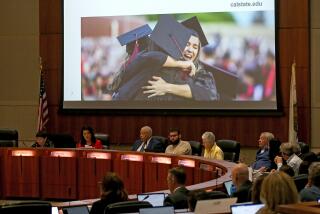There’s a problem with her legal advice: She’s not a lawyer
- Share via
Question: Our homeowners association president is an office manager for a large law firm. She is not a licensed attorney but states her opinions as if she were. Because of her position with the law firm, board members and owners accept and believe what she says as gospel. She got us involved with another law firm that represents only the board. Now she tells us that the board also is being counseled by a second law firm.
Are we homeowners being put in the path of danger?
Answer: Any board director’s action that subjects the association to risk or liability places all titleholders in the path of danger.
Merely working in a law firm does not qualify someone to give legal advice. Under the Business & Professions Code Section 6126, any person who practices law without authorization to do so is guilty of a misdemeanor punishable by up to one year in a county jail or by a fine of up to $1,000 or by both that fine and imprisonment. Although the board president may express her opinion, she may not express a legal opinion because that can be interpreted as engaging in the unauthorized practice of law.
Any uncompensated volunteer association director has only a qualified immunity from liability and shall not be personally liable for any damages in excess of the insurance coverage, providing certain conditions under Civil Code Section 1365.7 are met. Those include, but are not limited to, the fact that an act or omission was performed in “good faith” and that such actions were not “willful, wanton, or grossly negligent.”
Your board knows the president is not a licensed attorney. Under Code of Civil Procedure Section 1029.8, any unlicensed person who causes injury or damage as a result of providing goods or services for which a license is required shall be liable to the injured person for triple the amount of damages. Should a lawsuit ensue, the court also may award all costs and attorney’s fees to the injured person if that person prevails in the action.
In addition to that risk, Insurance Code Section 253 makes it clear that “no insurer shall issue or amend contracts of insurance in this state to provide coverage for the payment of any damages awarded to a person because of Code of Civil Procedure Section 1029.8.”
Boards need to act in good faith and deliberate with caution. All directors have an unequivocal duty to prevent any willful, wanton or grossly negligent representations.
Directors also have a duty to perform their own due diligence and not merely go along with the group. If any of the other board directors are aware of or condone the president’s actions, and are then sued by an owner who relied on the board president’s opinion or was damaged because the board acted on improper advice, all directors may find themselves uninsured, having to pay their own legal defense fees and any damages.
A lawyer providing advice to an association board director should be compelled to put the advice in writing. It is unacceptable for any board director to rely on the word of a third party to deliver second-hand legal advice.
Owners also should insist on reviewing all legal invoices from each billing attorney. If there are no invoices to substantiate the president’s contact with attorneys, the owners should consider removing that president at once as she poses a potential liability
Shopping for an attorney is one thing, but it is unacceptable for board members to unilaterally discuss association business with attorneys who are not employed by the association, even though the information disclosed by those board members may remain privileged.
Problems can also arise when board members discuss association business with one firm while being represented by another or by blindly following advice from an attorney where no attorney-client relationship exists.
Send questions to P.O. Box 11843, Marina del Rey, CA 90295, or e-mail [email protected].
More to Read
Sign up for Essential California
The most important California stories and recommendations in your inbox every morning.
You may occasionally receive promotional content from the Los Angeles Times.









